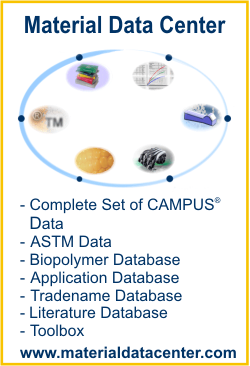Material Data Center is a leading international information system for the plastics industry. Material Data Center offers a comprehensive plastics database, calculation tools, CAE interfaces, a literature database and an application database. For more information about Material Data Center visit www.materialdatacenter.com.
This is the free Material Data Center Datasheet of PLEXIGLAS® Softlight zk6BR df23 - PMMA - Röhm GmbH
unit conversion, PDF datasheet print, comparison with other plastics, snap fit calculation, beam deflection calculation, parameters for material models, CAE Interfaces
Check here, which other Plexiglas datasheets, application examples or technical articles are available in Material Data Center
Productprofil:
PLEXIGLAS® Softlight zk6BR df23, based on PLEXIGLAS® Resist zk6BR, is an impact modified molding compound characterized by diffuse scattering of light.
Typical properties of impact modified PLEXIGLAS® molding compound are
- high break resistance and impact strength
- improved resistance to stress cracking
- good weather resistance
- high surface hardness and mar resistance
- the pleasant feel and sound of the moldings.
PLEXIGLAS® Softlight zk6BR df23 is characterized by the following special properties:
- excellent lightdiffusion combined with excellent light transmission
- matte surfaces can be obtained by varying the extrusion parameters.
Application:
Used for extruding profiles and sheets, but also for injection molding items for lighting engineering applications
Example:
applications that call for light diffusion combined with optimum transmission
Processing:
PLEXIGLAS® Softlight zk6BR df23 can be processed on extruders with 3-zone general purpose screws for engineering thermoplastics.
The matte finish of profile surfaces depends very much on machine design (calibrating unit, polishing rolls) and cooling conditions. It can be enhanced by controlled temperature reduction.
Physical Form / Packaging:
PLEXIGLAS® Softlight df molding compounds are supplied as pellets of uniform size, packaged in 25kg polyethylene bags; other packaging on request.
| Processing/Physical Characteristics | Value | Unit | Test Standard | ||||||||||||||||||||||||||||||||||||||||||||||||||||||||||||||||||||||||||||||||||||||||||||||||
| ISO Data | |||||||||||||||||||||||||||||||||||||||||||||||||||||||||||||||||||||||||||||||||||||||||||||||||||
| Melt volume-flow rate, MVR | 1.3 | cm³/10min | ISO 1133 | ||||||||||||||||||||||||||||||||||||||||||||||||||||||||||||||||||||||||||||||||||||||||||||||||
| Temperature | 230 | °C | - | ||||||||||||||||||||||||||||||||||||||||||||||||||||||||||||||||||||||||||||||||||||||||||||||||
| Load | 3.8 | kg | - | ||||||||||||||||||||||||||||||||||||||||||||||||||||||||||||||||||||||||||||||||||||||||||||||||
| Mechanical properties | Value | Unit | Test Standard | ||||||||||||||||||||||||||||||||||||||||||||||||||||||||||||||||||||||||||||||||||||||||||||||||
| ISO Data | |||||||||||||||||||||||||||||||||||||||||||||||||||||||||||||||||||||||||||||||||||||||||||||||||||
| Tensile Modulus | 1900 | MPa | ISO 527 | ||||||||||||||||||||||||||||||||||||||||||||||||||||||||||||||||||||||||||||||||||||||||||||||||
| Yield stress | 46 | MPa | ISO 527 | ||||||||||||||||||||||||||||||||||||||||||||||||||||||||||||||||||||||||||||||||||||||||||||||||
| Yield strain | 5 | % | ISO 527 | ||||||||||||||||||||||||||||||||||||||||||||||||||||||||||||||||||||||||||||||||||||||||||||||||
| Nominal strain at break | 36 | % | ISO 527 | ||||||||||||||||||||||||||||||||||||||||||||||||||||||||||||||||||||||||||||||||||||||||||||||||
| Charpy impact strength, +23°C | 50 | kJ/m² | ISO 179/1eU | ||||||||||||||||||||||||||||||||||||||||||||||||||||||||||||||||||||||||||||||||||||||||||||||||
| Thermal properties | Value | Unit | Test Standard | ||||||||||||||||||||||||||||||||||||||||||||||||||||||||||||||||||||||||||||||||||||||||||||||||
| ISO Data | |||||||||||||||||||||||||||||||||||||||||||||||||||||||||||||||||||||||||||||||||||||||||||||||||||
| Glass transition temperature, 10°C/min | 109 | °C | ISO 11357-1/-2 | ||||||||||||||||||||||||||||||||||||||||||||||||||||||||||||||||||||||||||||||||||||||||||||||||
| Temp. of deflection under load, 1.80 MPa | 93 | °C | ISO 75-1/-2 | ||||||||||||||||||||||||||||||||||||||||||||||||||||||||||||||||||||||||||||||||||||||||||||||||
| Temp. of deflection under load, 0.45 MPa | 99 | °C | ISO 75-1/-2 | ||||||||||||||||||||||||||||||||||||||||||||||||||||||||||||||||||||||||||||||||||||||||||||||||
| Vicat softening temperature, B | 99 | °C | ISO 306 | ||||||||||||||||||||||||||||||||||||||||||||||||||||||||||||||||||||||||||||||||||||||||||||||||
| Coeff. of linear therm. expansion, parallel | 90 | E-6/K | ISO 11359-1/-2 | ||||||||||||||||||||||||||||||||||||||||||||||||||||||||||||||||||||||||||||||||||||||||||||||||
| Electrical properties | Value | Unit | Test Standard | ||||||||||||||||||||||||||||||||||||||||||||||||||||||||||||||||||||||||||||||||||||||||||||||||
| ISO Data | |||||||||||||||||||||||||||||||||||||||||||||||||||||||||||||||||||||||||||||||||||||||||||||||||||
| Volume resistivity | >1E13 | Ohm*m | IEC 62631-3-1 | ||||||||||||||||||||||||||||||||||||||||||||||||||||||||||||||||||||||||||||||||||||||||||||||||
| Surface resistivity | 1E13 | Ohm | IEC 62631-3-2 | ||||||||||||||||||||||||||||||||||||||||||||||||||||||||||||||||||||||||||||||||||||||||||||||||
| Optical properties | Value | Unit | Test Standard | ||||||||||||||||||||||||||||||||||||||||||||||||||||||||||||||||||||||||||||||||||||||||||||||||
| ISO Data | |||||||||||||||||||||||||||||||||||||||||||||||||||||||||||||||||||||||||||||||||||||||||||||||||||
| Luminous transmittance | 81 | % | ISO 13468-1, -2 | ||||||||||||||||||||||||||||||||||||||||||||||||||||||||||||||||||||||||||||||||||||||||||||||||
| Other properties | Value | Unit | Test Standard |
| Density | 1150 | kg/m³ | ISO 1183 |
| Test specimen production | Value | Unit | Test Standard | ||||||||||||||||||||||||||||||||||||||||||||||||||||||||||||||||||||||||||||||||||||||||||||||||
| ISO Data | |||||||||||||||||||||||||||||||||||||||||||||||||||||||||||||||||||||||||||||||||||||||||||||||||||
| Injection Molding, melt temperature | 255 | °C | ISO 294 | ||||||||||||||||||||||||||||||||||||||||||||||||||||||||||||||||||||||||||||||||||||||||||||||||
| Injection Molding, mold temperature | 51 | °C | ISO 294 | ||||||||||||||||||||||||||||||||||||||||||||||||||||||||||||||||||||||||||||||||||||||||||||||||
| Injection Molding, injection velocity | 195 | mm/s | ISO 294 | ||||||||||||||||||||||||||||||||||||||||||||||||||||||||||||||||||||||||||||||||||||||||||||||||
Predrying temperature: max. 85 °C
Predrying time in a desiccant-type drier: 2 - 3 h
PROCESSING
Melt temperature: 220 - 260°C
Mold temperature:60 - 90°C
Predrying temperature: max. 85 °C
Predrying time in a desiccant-type drier: 2 - 3 h
PROCESSING
Melt temperature: 230 - 260 °C
Die temperature: 230 - 260 °C
Predrying temperature: max. 85 °C
Predrying time in a desiccant-type drier: 2 - 3 h
PROCESSING
Melt temperature: 230 - 260 °C
Die temperature: 230 - 260 °C
Material Data Center is provided by M-Base Engineering + Software GmbH. M-Base Engineering + Software GmbH assumes no liability for the system to be free of errors. Any decision about the application of materials must be double checked with the producer of this material.
Additional information about this material, like producer contact address, etc. can be found at www.materialdatacenter.com. For access to this extra information a registration is requested. Free online registration is available.













